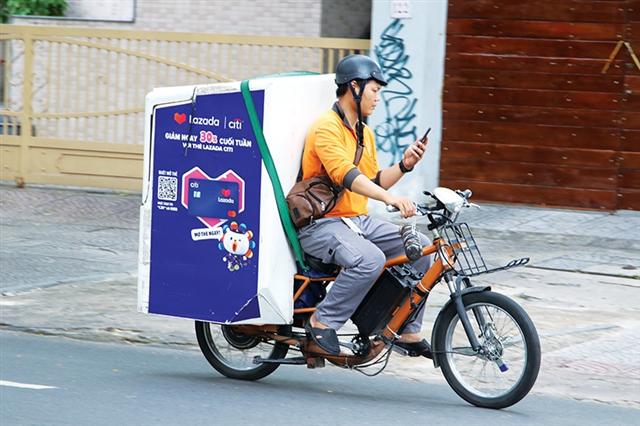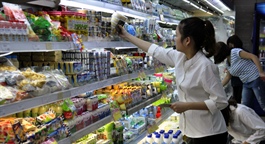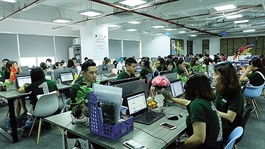Online food delivery trend destined to stay
Online food delivery trend destined to stay
As online food delivery trends have been supercharged by the pandemic, tech platforms are now making strong investments to tap into the surging demand.

Food ordering for delivery has been ingrained as a consumer habit thanks in part to the pandemic. Photo: Le Toan
|
Peter Christou, commercial director of Kantar Worldpanel Vietnam, said that the country witnessed a robust growth of online food delivery due to COVID-19, and the growing trend will likely continue in 2021 given the evolving situation of coronavirus and a “cautiously optimistic” perspective of Vietnamese consumers.
There was a rapid adoption in online food delivery from consumers, businesses, and service providers, yet a lasting growth of online food delivery is expected in the coming time.
Christou noted that early signs indicate that this is a habit that will stick, as the spend level of online food delivery remained consistent, even as restrictions eased and out-of-home spend started to recover when restaurants/stores reopened.
Online food delivery is used once a week or more by more than one-fifth of people living in Ho Chi Minh City, which is among the highest markets in the frequency of use, yet some say there is still room to increase.
Realising the vast potential, investors have started to cash in on this market segment. Most recently, Loship has announced its latest investment from Skype co-founder Jaan Tallinn, who participated through his investment vehicle MetaPlanet Holdings.
Commenting on the latest funding, Loship CEO Trung Hoang Nguyen told VIR that there are a few spending items on the table for the company currently. “First is market expansion – Loship already has a winning playbook, and the startup is looking to expand it to more markets. Secondly, a huge portion of funding will be used to upgrade its app and increase its tech capability,” Nguyen said. “Finally, the startup will ramp up marketing strategies to strengthen Loship’s foothold in the existing markets.”
He noted that the online food delivery market will remain competitive for at least the next 2-3 years. Vietnam poses many favourable conditions for food delivery, including the vast market, substantial user base, high internet and mobile penetration rate, and more. As such, it attracts many players to tap into and capture the market share.
“Simplified e-banking systems and improved food-service logistics, coupled with changing customer lifestyles, are also some of the prime factors propelling the food delivery market growth. The pandemic has necessitated the act of home delivery, which drives growth even further,” he said. “Also, Vietnam’s startup ecosystem will continue to flourish and attract investment, allowing local players to compete with foreign ones. We believe that this environment will benefit homegrown players like Loship.”
Likewise, Xiaole Kuang, head of engineering in deliveries at Grab, said that online food delivery will become a mainstay. Grab is building and iterating existing tech with the aim of delivering a delightful experience for users when they browse, order, and wait for their food to arrive. For customers, GrabFood currently offers five types of ordering functions within the app – delivery on-demand, self pick-up, scheduled delivery, group order, and mix-and-match. Meanwhile, Grab has worked on several back-end technology products to make fulfilment more efficient for merchant partners.
Indeed, GrabFood has seen its merchant partners grow three times from the first quarter to the third in 2020 with average order value up 26 per cent. GrabFood covers 18 cities and provinces with average delivery speed of 20 minutes per order.
Last week, Gojek launched a special application for GoFood partners, GoBiz in Vietnam. More than 80 per cent of restaurants and eateries on Gojek are using GoBiz every day, which helps shorten the time from restaurant to customer time by up to 50 per cent and increase the number of completed orders by 300 per cent.
Other players in the market have also stepped up their game. Baemin has recently launched in the central city of Danang, making its expansion in the central region. Meanwhile, Foody’s Now is diversifying its delivery services from food and medicines to flowers to compete with other rivals.
A survey by Q&Me shows that GrabFood or Now are the most popular delivery apps, with Baemin and GoFood following close behind. GrabFood and Now are still dominant in the market but Baemin has the best growth for now.
“Obviously, the competition will be fiercer than ever and the winners will be those who embrace partnerships and deliver excellent customer experiences,” Christou said, pointing out the biggest challenge for online food delivery platforms is how to attract investors for expansion.























